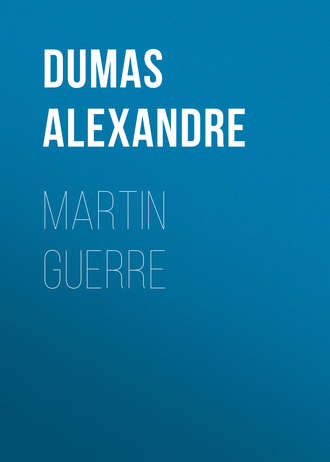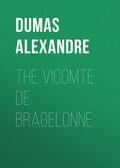
Александр Дюма
Martin Guerre
His uncle coughed and cleared his voice before replying, then said slowly, as if counting his words —
“It is all accounted for, my dear nephew; Heaven be praised! I don’t owe you anything.”
“What!” exclaimed the astonished Martin, “but the whole income?”
“Was well and properly employed in the maintenance of your wife and child.”
“What! a thousand livres for that? And Bertrande lived alone, so quietly and simply! Nonsense! it is impossible.”
“Any surplus,” resumed the old man, quite unmoved, – “any surplus went to pay the expenses of seed-time and harvest.”
“What! at a time when labour costs next to nothing?”
“Here is the account,” said Pierre.
“Then the account is a false one,” returned his nephew.
Pierre thought it advisable to appear extremely offended and angry, and Martin, exasperated at his evident dishonesty, took still higher ground, and threatened to bring an action against him. Pierre ordered him to leave the house, and suiting actions to words, took hold of his arm to enforce his departure. Martin, furious, turned and raised his fist to strike.
“What! strike your uncle, wretched boy!” exclaimed the old man.
Martin’s hand dropped, but he left the house uttering reproaches and insults, among which Pierre distinguished —
“Cheat that you are!”
“That is a word I shall remember,” cried the angry old man, slamming his door violently.
Martin brought an action before the judge at Rieux, and in course of time obtained a decree, which, reviewing the accounts presented by Pierre, disallowed them, and condemned the dishonest guardian to pay his nephew four hundred livres for each year of his administration. The day on which this sum had to be disbursed from his strong box the old usurer vowed vengeance, but until he could gratify his hatred he was forced to conceal it, and to receive attempts at reconciliation with a friendly smile. It was not until six months later, on the occasion of a joyous festivity, that Martin again set foot in his uncle’s house. The bells were ringing for the birth of a child, there was great gaiety at Bertrande’s house, where all the guests were waiting on the threshold for the godfather in order to take the infant to church, and when Martin appeared, escorting his uncle, who was adorned with a huge bouquet for the occasion, and who now came forward and took the hand of Rose, the pretty godmother, there were cries of joy on all sides. Bertrande was delighted at this reconciliation, and dreamed only of happiness. She was so happy now, her long sorrow was atoned for, her regret was at an end, her prayers seemed to have been heard, the long interval between the former delights and the present seemed wiped out as if the bond of union had never been broken, and if she remembered her grief at all, it was only to intensify the new joys by comparison. She loved her husband more than ever; he was full of affection for her, and she was grateful for his love. The past had now no shadow, the future no cloud, and the birth of a daughter, drawing still closer the links which united them, seemed a new pledge of felicity. Alas! the horizon which appeared so bright and clear to the poor woman was doomed soon again to be overcast.
The very evening of the christening party, a band of musicians and jugglers happened to pass through the village, and the inhabitants showed themselves liberal. Pierre asked questions, and found that the leader of the band was a Spaniard. He invited the man to his own house, and remained closeted with him for nearly an hour, dismissing him at length with a refilled purse. Two days later the old man announced to the family that he was going to Picardy to see a former partner on a matter of business, and he departed accordingly, saying he should return before long.
The day on which Bertrande again saw her uncle was, indeed, a terrible one. She was sitting by the cradle of the lately-born infant, watching for its awakening, when the door opened, and Pierre Guerre strode in. Bertrande drew back with an instinct of terror as soon as she saw him, for his expression was at once wicked and joyful – an expression of gratified hate, of mingled rage and triumph, and his smile was terrible to behold. She did not venture to speak, but motioned him to a seat. He came straight up to her, and raising his head, said loudly —
“Kneel down at once, madame – kneel down, and ask pardon from Almighty God!”
“Are you mad, Pierre?” she replied, gazing at him in astonishment.
“You, at least, ought to know that I am not.”
“Pray for forgiveness – I – ! and what for, in Heaven’s name?”
“For the crime in which you are an accomplice.”
“Please explain yourself.”
“Oh!” said Pierre, with bitter irony, “a woman always thinks herself innocent as long as her sin is hidden; she thinks the truth will never be known, and her conscience goes quietly to sleep, forgetting her faults. Here is a woman who thought her sins nicely concealed; chance favoured her: an absent husband, probably no more; another man so exactly like him in height, face, and manner that everyone else is deceived! Is it strange that a weak, sensitive woman, wearied of widowhood, should willingly allow herself to be imposed on?”
Bertrande listened without understanding; she tried to interrupt, but Pierre went on —
“It was easy to accept this stranger without having to blush for it, easy to give him the name and the rights of a husband! She could even appear faithful while really guilty; she could seem constant, though really fickle; and she could, under a veil of mystery, at once reconcile her honour, her duty – perhaps even her love.”
“What on earth do you mean?” cried Bertrande, wringing her hands in terror.
“That you are countenancing an impostor who is not your husband.”
Feeling as if the ground were passing from beneath her, Bertrande staggered, and caught at the nearest piece of furniture to save herself from falling; then, collecting all her strength to meet this extraordinary attack, she faced the old man.
“What! my husband, your nephew, an impostor!”
“Don’t you know it?” “I!!”
This cry, which came from her heart, convinced Pierre that she did not know, and that she had sustained a terrible shock. He continued more quietly —
“What, Bertrande, is it possible you were really deceived?”
“Pierre, you are killing me; your words are torture. No more mystery, I entreat. What do you know? What do you suspect? Tell me plainly at once.”
“Have you courage to hear it?”
“I must,” said the trembling woman.
“God is my witness that I would willingly have kept it from you, but you must know; if only for the safety of your soul entangled in so deadly a snare… there is yet time, if you follow my advice. Listen: the man with whom you are living, who dares to call himself Martin Guerre, is a cheat, an impostor – ”
“How dare you say so?”
“Because I have discovered it. Yes, I had always a vague suspicion, an uneasy feeling, and in spite of the marvellous resemblance I could never feel as if he were really my sister’s child. The day he raised his hand to strike me – yes, that day I condemned him utterly… Chance has justified me! A wandering Spaniard, an old soldier, who spent a night in the village here, was also present at the battle of St. Quentin, and saw Martin Guerre receive a terrible gunshot wound in the leg. After the battle, being wounded, he betook himself to the neighbouring village, and distinctly heard a surgeon in the next room say that a wounded man must have his leg amputated, and would very likely not survive the operation. The door opened, he saw the sufferer, and knew him for Martin Guerre. So much the Spaniard told me. Acting on this information, I went on pretence of business to the village he named, I questioned the inhabitants, and this is what I learned.”
“Well?” said Bertrande, pale, and gasping with emotion.
“I learned that the wounded man had his leg taken off, and, as the surgeon predicted, he must have died in a few hours, for he was never seen again.”
Bertrande remained a few moments as if annihilated by this appalling revelation; then, endeavoring to repel the horrible thought —
“No,” she cried, “no, it is impossible! It is a lie intended to ruin him-to ruin us all.”
“What! you do not believe me?”
“No, never, never!”
“Say rather you pretend to disbelieve me: the truth has pierced your heart, but you wish to deny it. Think, however, of the danger to your immortal soul.”
“Silence, wretched man!.. No, God would not send me so terrible a trial. What proof can you show of the truth of your words?”
“The witnesses I have mentioned.”
“Nothing more?”
“No, not as yet.”
“Fine proofs indeed! The story of a vagabond who flattered your hatred in hope of a reward, the gossip of a distant village, the recollections of ten years back, and finally, your own word, the word of a man who seeks only revenge, the word of a man who swore to make Martin pay dearly for the results of his own avarice, a man of furious passions such as yours! No, Pierre, no, I do not believe you, and I never will!”
“Other people may perhaps be less incredulous, and if I accuse him publicly – ”
“Then I shall contradict you publicly!” And coming quickly forward, her eyes shining with virtuous anger —
“Leave this house, go,” she said; “it is you yourself who are the impostor – go!”
“I shall yet know how to convince everyone, and will make you acknowledge it,” cried the furious old man.
He went out, and Bertrande sank exhausted into a chair. All the strength which had supported her against Pierre vanished as soon as she was alone, and in spite of her resistance to suspicion, the terrible light of doubt penetrated her heart, and extinguished the pure torch of trustfulness which had guided her hitherto – a doubt, alas! which attacked at once her honour and her love, for she loved with all a woman’s tender affection. Just as actual poison gradually penetrates and circulates through the whole system, corrupting the blood and affecting the very sources of life until it causes the destruction of the whole body, so does that mental poison, suspicion, extend its ravages in the soul which has received it. Bertrande remembered with terror her first feelings at the sight of the returned Martin Guerre, her involuntary repugnance, her astonishment at not feeling more in touch with the husband whom she had so sincerely regretted. She remembered also, as if she saw it for the first time, that Martin, formerly quick, lively, and hasty tempered, now seemed thoughtful, and fully master of himself.
This change of character she had supposed due to the natural development of age, she now trembled at the idea of another possible cause. Some other little details began to occur to her mind – the forgetfulness or abstraction of her husband as to a few insignificant things; thus it sometimes happened that he did not answer to his name of Martin, also that he mistook the road to a hermitage, formerly well known to them both, and again that he could not answer when addressed in Basque, although he him self had taught her the little she knew of this language. Besides, since his return, he would never write in her presence, did he fear that she would notice some difference? She had paid little or no attention to these trifles; now, pieced together, they assumed an alarming importance. An appalling terror seized Bertrande: was she to remain in this uncertainty, or should she seek an explanation which might prove her destruction? And how discover the truth – by questioning the guilty man, by noting his confusion, his change of colour, by forcing a confession from him? But she had lived with him for two years, he was the father of her child, she could not ruin him without ruining herself, and, an explanation once sought, she could neither punish him and escape disgrace, nor pardon him without sharing his guilt. To reproach him with his conduct and then keep silence would destroy her peace for ever; to cause a scandal by denouncing him would bring dishonour upon herself and her child. Night found her involved in these hideous perplexities, too weak to surmount them; an icy chill came over her, she went to bed, and awoke in a high fever. For several days she hovered between life and death, and Martin Guerre bestowed the most tender care upon her. She was greatly moved thereby, having one of those impressionable minds which recognise kindness fully as much as injury. When she was a little recovered and her mental power began to return, she had only a vague recollection of what had occurred, and thought she had had a frightful dream. She asked if Pierre Guerre had been to see her, and found he had not been near the house. This could only be explained by the scene which had taken place, and she then recollected all the accusation Pierre had made, her own observations which had confirmed it, all her grief and trouble. She inquired about the village news. Pierre, evidently, had kept silence why? Had he seen that his suspicions were unjust, or was he only seeking further evidence? She sank back into her cruel uncertainty, and resolved to watch Martin closely, before deciding as to his guilt or innocence.
How was she to suppose that God had created two faces so exactly alike, two beings precisely similar, and then sent them together into the world, and on the same track, merely to compass the ruin of an unhappy woman! A terrible idea took possession of her mind, an idea not uncommon in an age of superstition, namely, that the Enemy himself could assume human form, and could borrow the semblance of a dead man in order to capture another soul for his infernal kingdom. Acting on this idea, she hastened to the church, paid for masses to be said, and prayed fervently. She expected every day to see the demon forsake the body he had animated, but her vows, offerings, and prayers had no result. But Heaven sent her an idea which she wondered had not occurred to her sooner. “If the Tempter,” she said to herself, “has taken the form of my beloved husband, his power being supreme for evil, the resemblance would be exact, and no difference, however slight, would exist. If, however, it is only another man who resembles him, God must have made them with some slight distinguishing marks.”
She then remembered, what she had not thought of before, having been quite unsuspicious before her uncle’s accusation, and nearly out of her mind between mental and bodily suffering since. She remembered that on her husband’s left shoulder, almost on the neck, there used to be one of those small, almost imperceptible, but ineffaceable birthmarks. Martin wore his hair very long, it was difficult to see if the mark were there or not. One night, while he slept, Bertrande cut away a lock of hair from the place where this sign ought to be – it was not there!
Convinced at length of the deception, Bertrande suffered inexpressible anguish. This man whom she had loved and respected for two whole years, whom she had taken to her heart as a husband bitterly mourned for – this man was a cheat, an infamous impostor, and she, all unknowing, was yet a guilty woman! Her child was illegitimate, and the curse of Heaven was due to this sacrilegious union. To complete the misfortune, she was already expecting another infant. She would have killed herself, but her religion and the love of her children forbade it. Kneeling before her child’s cradle, she entreated pardon from the father of the one for the father of the other. She would not bring herself to proclaim aloud their infamy.
“Oh!” she said, “thou whom I loved, thou who art no more, thou knowest no guilty thought ever entered my mind! When I saw this man, I thought I beheld thee; when I was happy, I thought I owed it to thee; it was thee whom I loved in him. Surely thou dost not desire that by a public avowal I should bring shame and disgrace on these children and on myself.”
She rose calm and strengthened: it seemed as if a heavenly inspiration had marked out her duty. To suffer in silence, such was the course she adopted, – a life of sacrifice and self-denial which she offered to God as an expiation for her involuntary sin. But who can understand the workings of the human heart? This man whom she ought to have loathed, this man who had made her an innocent partner in his crime, this unmasked impostor whom she should have beheld only with disgust, she-loved him! The force of habit, the ascendancy he had obtained over her, the love he had shown her, a thousand sympathies felt in her inmost heart, all these had so much influence, that, instead of accusing and cursing him, she sought to excuse him on the plea of a passion to which, doubtless, he had yielded when usurping the name and place of another. She feared punishment for him yet more than disgrace for herself, and though resolved to no longer allow him the rights purchased by crime, she yet trembled at the idea of losing his love. It was this above all which decided her to keep eternal silence about her discovery; one single word which proved that his imposture was known would raise an insurmountable barrier between them.
To conceal her trouble entirely was, however, beyond her power; her eyes frequently showed traces of her secret tears. Martin several times asked the cause of her sorrow; she tried to smile and excuse herself, only immediately sinking back into her gloomy thoughts. Martin thought it mere caprice; he observed her loss of colour, her hollow cheeks, and concluded that age was impairing her beauty, and became less attentive to her. His absences became longer and more frequent, and he did not conceal his impatience and annoyance at being watched; for her looks hung upon his, and she observed his coldness and change with much grief. Having sacrificed all in order to retain his love, she now saw it slowly slipping away from her.







